Details of new payment scheme for farmers unveiled
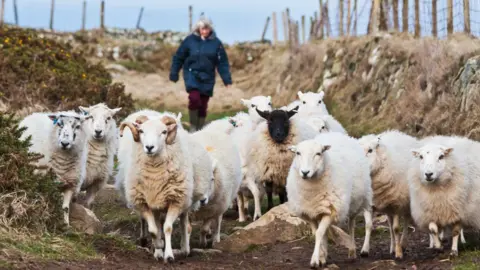 Getty Images
Getty ImagesMajor changes to the financial support available for agriculture marks "a new relationship between the people of Wales and farmers", the Welsh government has said.
Its protest-hit plan for greener farm subsidy payments - known as the Sustainable Farming Scheme (SFS) - has been seven years in the making.
Industry leaders have described the publication of a final set of proposals as "a once in a generation event".
But wildlife groups warned the new plan fell "far short" of helping farmers to successfully tackle climate change and nature loss.
The SFS will replace EU-era subsidies, which farmers had received for decades based largely on how much land they had.
Most rely on these payments - an average of 67% of Welsh farm income - came from subsidies in 2020-21.
The new approach aims to reward sustainable farming practices and the delivery of "public goods" like wildlife habitat and soaking up carbon in the land.
For their initial "universal" payment, farmers will have to agree to carry out 12 actions ranging from soil health planning and habitat maintenance, to online courses to enhance knowledge and skills related to sustainable farming.
The sums also include funding to recognise "social value" - something farmers had called for - and which aims to recognise what are described as the wider benefits that sustainable agriculture provides to society, from food production to sustaining rural communities.
There will also be an extra £1,000 for smaller farms in 2026 as a one-off stability payment to acknowledge the uncertain period of transition.
The scheme's optional layer is intended to top up farm incomes for further environmental work, including woodland creation, improved public access to the countryside and support to go organic.
A collaborative payment will also be available in future to support farmers working together on landscape-scale projects.
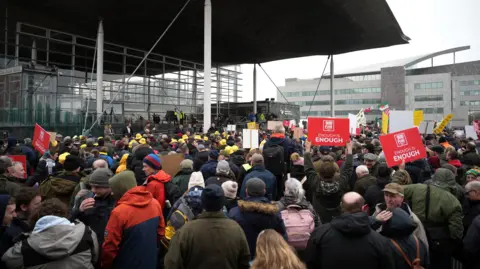 Getty
GettyThe Welsh government has said it will commit £238m in 2026 for the universal payments - equivalent to the current, main subsidy farms receive, known as the Basic Payment Scheme (BPS).
"Significant" funding for optional and collaborative work is also promised - with an overall budget similar to the £340m currently designated to farming.
But farming unions and environmental groups alike said far more was required - closer to £500m, to account for rising costs in agriculture and the scale of what was now being asked of farmers to deliver.
CLA Cymru said it was frustrating the total budget remained static, but the Farmers' Union of Wales (FUW) said the plan proposed "workable payment rates" and provided "much needed stability for the sector".
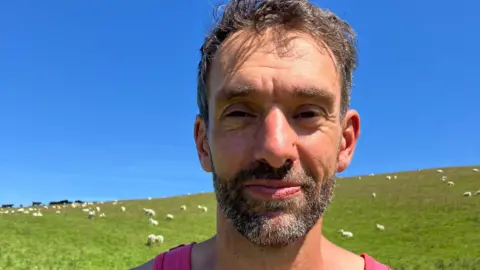
Rhodri Lloyd-Williams, who farms sheep and cattle across 750 acres of hillside near Talybont, Ceredigion, said this was "a massive moment", after "years of uncertainty" following the Brexit vote in 2016.
As an organic farmer and member of the Nature Friendly Farming Network, his is exactly the sort of farming system ministers want to support, from rotational grazing of livestock to boost soil health, to planting hedges and trees.
He said he would glad to see the new scheme include "a bit more encouragement" for this sort of work, which he said could deliver "multiple benefits" for both the farming business and environment.
But "first and foremost we need to keep Welsh farmers farming," he said.
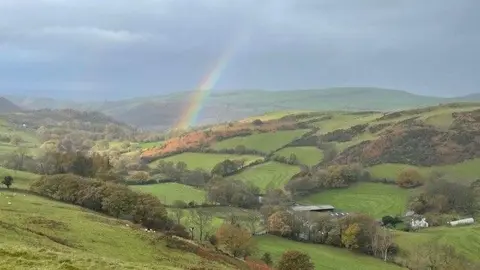 NFFN
NFFNDebate over the years has focused on how to make the scheme workable for farmers while ambitious enough to deliver against Wales' environmental goals.
The government had already made some major concessions - such as scrapping a requirement for farms to have 10% tree cover to qualify for funding, after widespread farmer protests in 2024.
Today's plan outlines a new approach to encouraging tree-planting.
All farmers entering the scheme will need to complete an opportunity plan for woodland and hedgerow creation in the first year and demonstrate progress towards it by 2028.
The government said it was asking farmers to plant at least 0.1 hectares - or 250 trees by the end of 2028.
There would be "generous support for tree and hedgerow planting" in the optional layer, including a higher payment rate for tree planting during the first three years of the scheme.
The aim is for the scheme to deliver at least 17,000 hectares of new tree planting across Wales by 2030, with an aspiration of achieving 21,500 hectares.
The government's also targeting 1,500km (932 miles) of hedgerow extension by 2030, with an aspiration of achieving 2,000km (1,243 miles).
'Deeply concerned'
But wildlife groups said they felt much of the scheme has been watered down to placate protesting farmers.
Rachel Sharp, director of Wildlife Trusts Wales, said the organisation was "deeply concerned" the SFS would not "adequately address the climate and nature crises".
"Welsh farming is in crisis - fewer farms, fewer jobs, and increasing environmental damage.
"We need to see an increased budget for the SFS, specifically for the optional and collaborative tiers, to help farmers transition to nature-friendly farming practices," she urged.
Alexander Phillips, Policy and Advocacy Manager at WWF Cymru said it appeared the SFS was now "sustainable in name only".
"Today's proposals for the first year fall far short of what's needed to deliver change quickly, and in part risks recreating bits of the old schemes with exaggerated area-based payment rates for little apparent public good," he said.
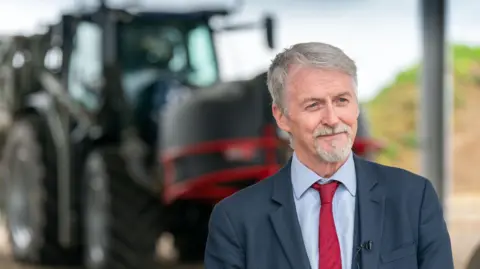 Welsh government
Welsh governmentThe announcement comes ahead of the start of the annual Royal Welsh Agricultural Show next week, where politicians of all colours will be setting out their own vision for the future of farming and the countryside with less than a year to a Senedd election.
By then, the government promises a tool will be ready on their website for farmers to be able to calculate an indicative SFS payment for their farm.
Deputy first minister with responsibility for climate change and rural affairs, Huw Irranca-Davies, said the government had "listened carefully to farmers across Wales and revised our approach to ensure it works for the agricultural industry and meets our shared responsibilities to the natural world around us".
"With this in mind, the scheme represents a new relationship between the people of Wales and our farmers.
"This is not just a scheme for farmers, this is a scheme for the whole of Wales – a whole farm, whole nation approach," he said.
Llyr Gruffydd, Plaid Cymru's spokesman for agriculture and rural affairs, said the scheme was an improvement on original proposals, but a one-year pledge was "simply not enough".
Samuel Kurtz, his counterpart in the Welsh Conservatives, added: "Crucially, without an accompanying economic impact assessment, we are still in the dark about the real-world consequences of Labour's scheme, there is a lack of clarity and security around future funding and without a vote in the Senedd, the new scheme lacks democratic legitimacy."
